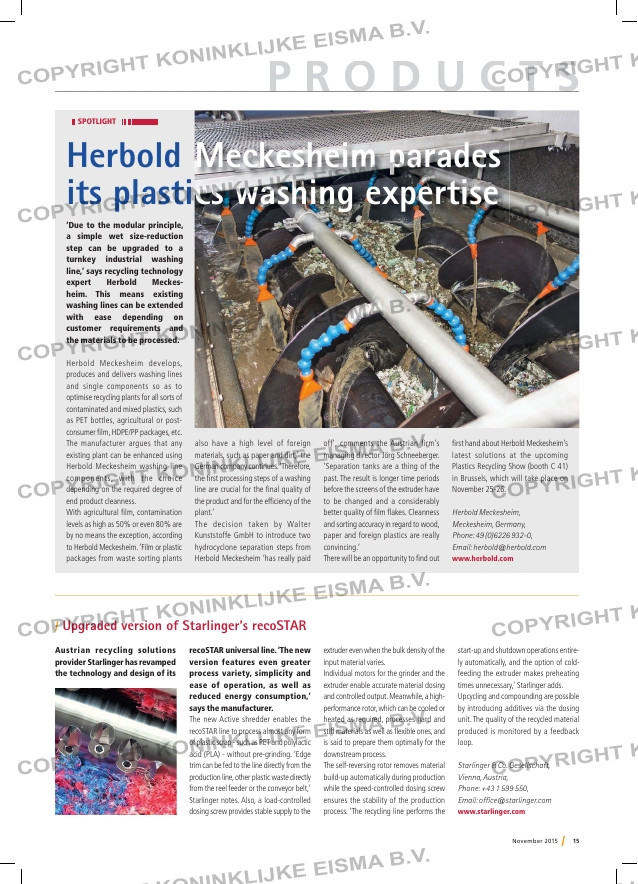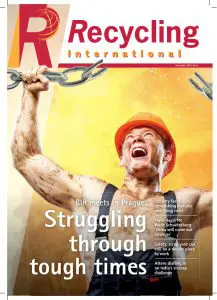Page 17 from: November 2015

15November 2015
‘Due to the modular principle,
a simple wet size-reduction
step can be upgraded to a
turnkey industrial washing
line,’ says recycling technology
expert Herbold Meckes-
heim. This means existing
washing lines can be extended
with ease depending on
customer requirements and
the materials to be processed.
Herbold Meckesheim develops,
produces and delivers washing lines
and single components so as to
optimise recycling plants for all sorts of
contaminated and mixed plastics, such
as PET bottles, agricultural or post-
consumer film, HDPE/PP packages, etc.
The manufacturer argues that any
existing plant can be enhanced using
Herbold Meckesheim washing line
components, with the choice
depending on the required degree of
end product cleanness.
With agricultural film, contamination
levels as high as 50% or even 80% are
by no means the exception, according
to Herbold Meckesheim. ‘Film or plastic
packages from waste sorting plants
also have a high level of foreign
materials, such as paper and dirt,’ the
German company continues. ‘Therefore,
the first processing steps of a washing
line are crucial for the final quality of
the product and for the efficiency of the
plant.’
The decision taken by Walter
Kunststoffe GmbH to introduce two
hydrocyclone separation steps from
Herbold Meckesheim ‘has really paid
off’, comments the Austrian firm’s
managing director Jörg Schneeberger.
‘Separation tanks are a thing of the
past. The result is longer time periods
before the screens of the extruder have
to be changed and a considerably
better quality of film flakes. Cleanness
and sorting accuracy in regard to wood,
paper and foreign plastics are really
convincing.’
There will be an opportunity to find out
first hand about Herbold Meckesheim’s
latest solutions at the upcoming
Plastics Recycling Show (booth C 41)
in Brussels, which will take place on
November 25-26.
Herbold Meckesheim,
Meckesheim, Germany,
Phone: 49 (0)6226 932-0,
Email: [email protected]
www.herbold.com
P R O D U C T S
SPOTLIGHT
Upgraded version of Starlinger’s recoSTAR
Austrian recycling solutions
provider Starlinger has revamped
the technology and design of its
recoSTAR universal line. ‘The new
version features even greater
process variety, simplicity and
ease of operation, as well as
reduced energy consumption,’
says the manufacturer.
The new Active shredder enables the
recoSTAR line to process almost any form
of plastic scrap – such as PET and polylactic
acid (PLA) – without pre-grinding. ‘Edge
trim can be fed to the line directly from the
production line, other plastic waste directly
from the reel feeder or the conveyor belt,’
Starlinger notes. Also, a load-controlled
dosing screw provides stable supply to the
extruder even when the bulk density of the
input material varies.
Individual motors for the grinder and the
extruder enable accurate material dosing
and controlled output. Meanwhile, a high-
performance rotor, which can be cooled or
heated as required, processes hard and
stiff materials as well as flexible ones, and
is said to prepare them optimally for the
downstream process.
The self-reversing rotor removes material
build-up automatically during production
while the speed-controlled dosing screw
ensures the stability of the production
process. ‘The recycling line performs the
start-up and shutdown operations entire-
ly automatically, and the option of cold-
feeding the extruder makes preheating
times unnecessary,’ Starlinger adds.
Upcycling and compounding are possible
by introducing additives via the dosing
unit. The quality of the recycled material
produced is monitored by a feedback
loop.
Starlinger & Co. Gesellschaft,
Vienna, Austria,
Phone: +43 1 599 550,
Email: [email protected]
www.starlinger.com
Herbold
its plasti
Meckesheim parades
cs washing expertise



